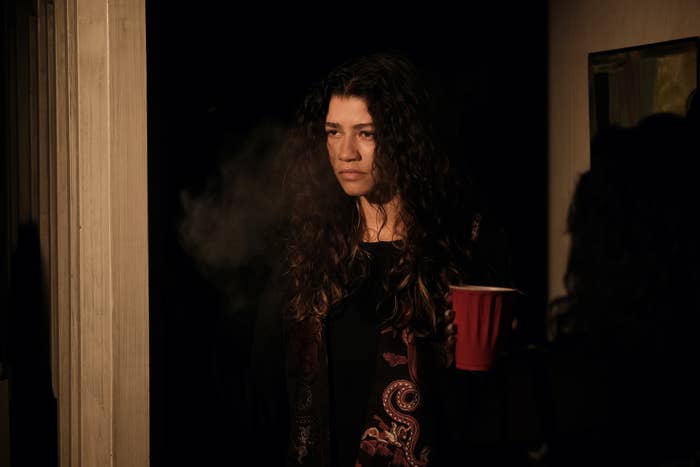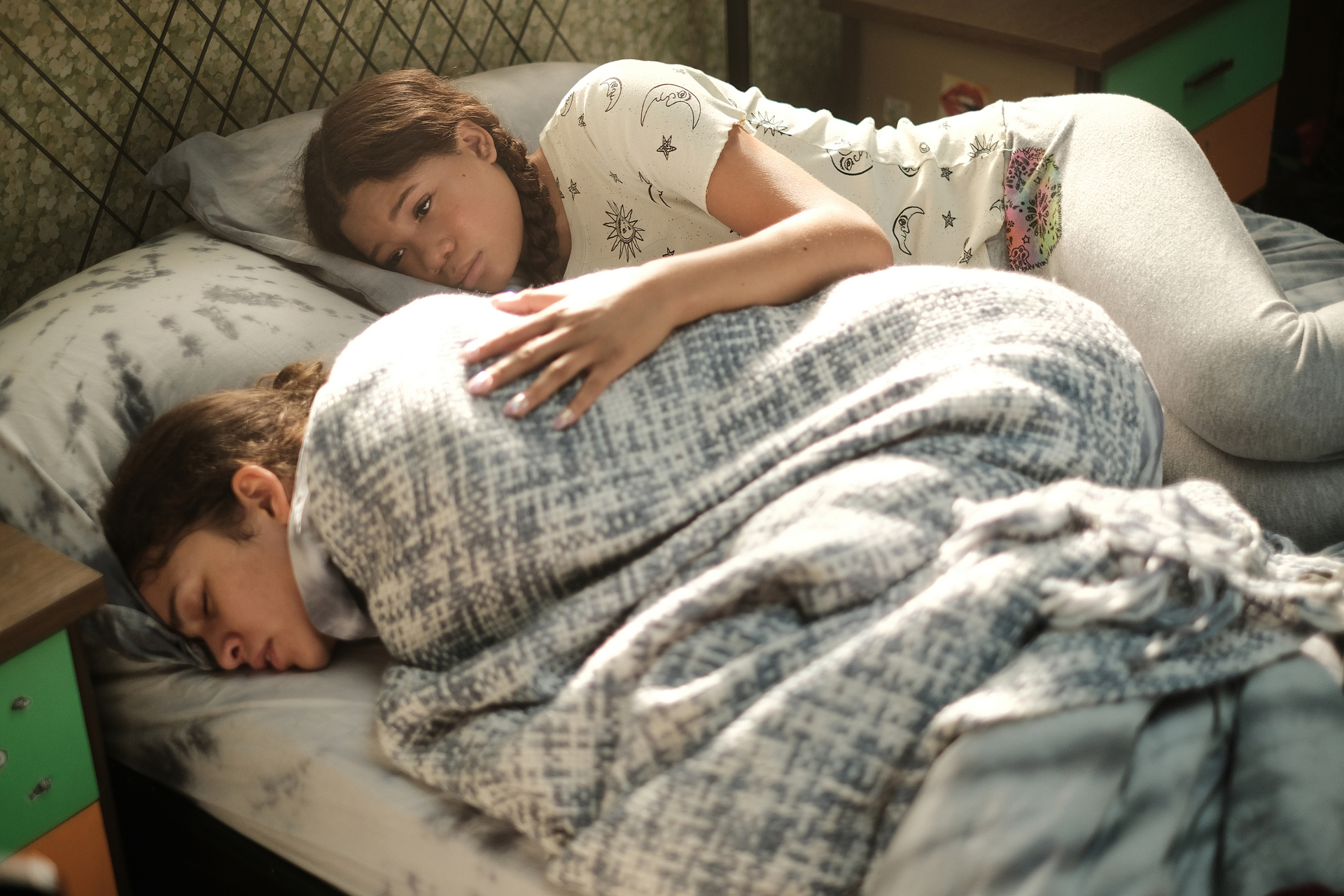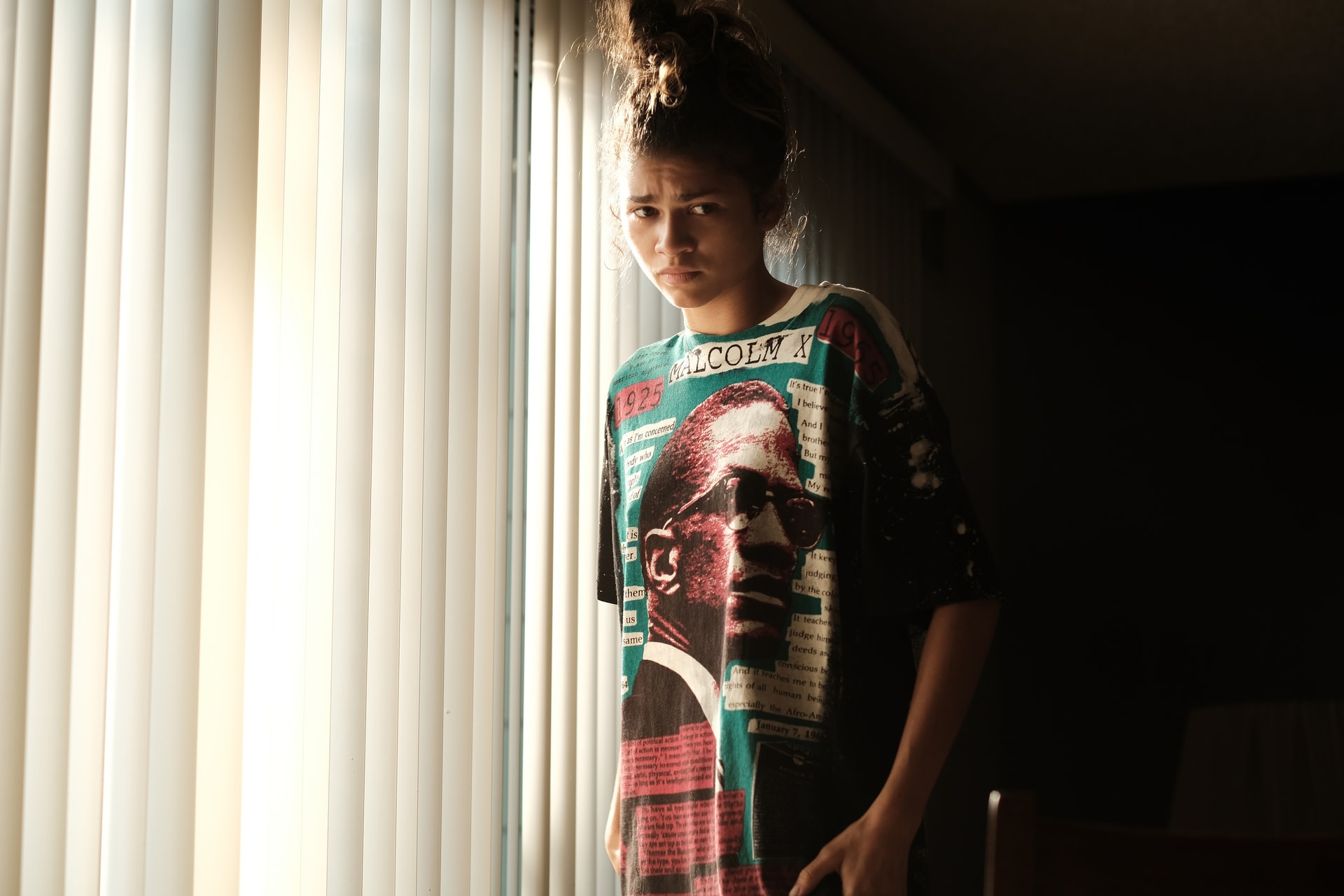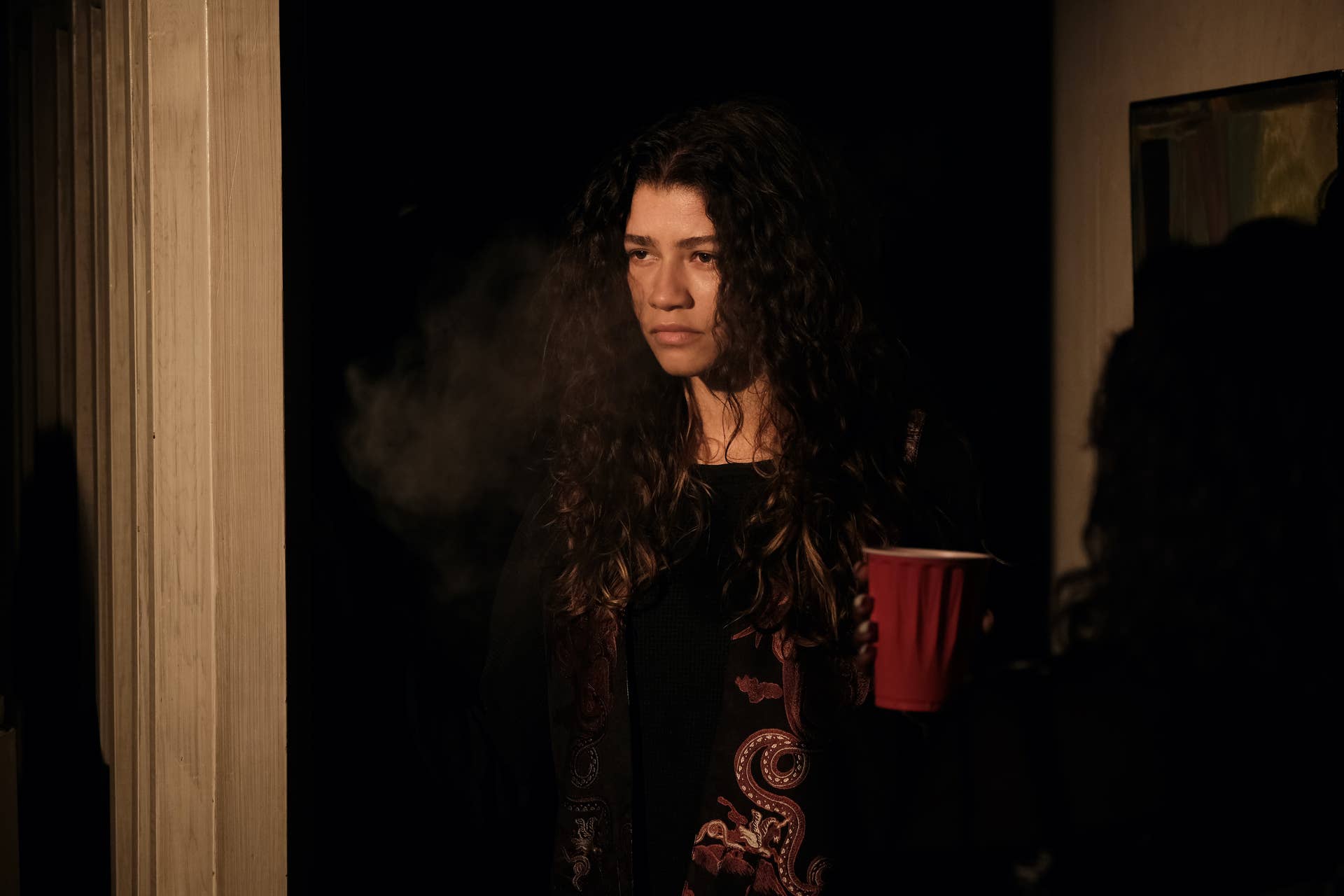
There has been plenty of conversation regarding Euphoria and its portrayal of addiction. Some, like the anti-drug education program D.A.R.E., believe the show is glorifying drug use, while others believe it’s doing a service by portraying the realities of what it’s like to be and deal with somebody who has an addiction. For some viewers, the HBO show’s protagonist Rue Bennett’s substance abuse storyline is also exposing them to a world that may have been foreign to them until now. Zendaya’s portrayal of a 17-year-old battling a drug addiction was so compelling that she made history as the youngest woman to win Best Actress in a Drama Series at the Emmys. In Season 2, viewers watched Rue relapse, consuming everything from opiates to heroin to fentanyl, and manage to put her life in danger on more than one occasion. The show’s critics believe the R-rated series isn’t setting a good example for younger viewers, but people who have been in Rue’s shoes, doctors who treat patients like Rue, and people whose loved ones struggle with addiction, disagree. There is plenty that the drama is getting right about addiction and recovery, but since millions of people have gravitated to the show and its characters in just two seasons, the writers and creators now have an even wider responsibility of making sure to also right the show’s many wrongs.
Former pro BMX racer Tony Hoffman saw his dreams of one day competing in the Olympics come crashing down when he started battling a drug addiction in his teenage years. After being homeless and serving time in prison, Hoffman turned his life around and is now in long-term recovery; he attended the 2016 Rio Olympic Games as a coach and is also a substance abuse speaker creating awareness around the country about the dangers of prescription pill and heroin abuse. As someone who knows the lows of addiction, he doesn’t agree with critics who say the show makes drugs alluring or “cool.” He believes there might be some viewers who are already predisposed to using drugs who are looking to relate because of their own circumstances. Rue’s journey with addiction started when she was just 13 years old while her father was battling cancer. She had access to his medication, and to cope with her dad’s deteriorating health, her own anxiety and mental health disorders, she started stealing his medication. Hoffman believes that seeing a character stealing prescription pills from their parents isn’t immediately going to inspire viewers to do the same. “We can show that to 1,000 kids, the majority aren’t going to. The ones that do are already hurt, they are looking for something to help them get there,” Hoffman tells Complex. “When you look at it from a psychological standpoint, individuals are looking to make connections. We typically make connections with people, places, and things we feel understand us. If we’re going through trauma, and we turn on a show like Euphoria and we see an individual who is experiencing trauma, we instantly relate to that person.
“Through that relatability, we then see how they cope with that experience,” he adds. “It’s not so much about its ‘coolness,’ but through what psychologists would call a ‘trauma bond.’ You find yourself engaging in similar activities because that’s what you relate to the most.” Some medical professionals also don’t believe TV shows or movies have enough impact to drive people to use drugs.


Hoffman knows from experience that no one intends to ruin their lives when they first try drugs. He became a BMX Elite Pro in high school but trying drugs and alcohol in his senior year to deal with anxiety and stress derailed his journey for 10 years. Trying marijuana led to him trying cocaine and other drugs, which led to a severe addiction that eventually left him homeless and landed him in prison for two years for an armed robbery. “Nobody goes down that path because they thought it was going to be cool. Everybody goes down that path with the mindset, ‘I won’t let it go that far.’ Nobody goes into it with the mindset of, ‘This is where I’m going to drive my life.’ It’s always, ‘It’ll never happen to me,’” Hoffman says. “Some individuals who speak from a place of inexperience will always say, ‘I stopped doing it. I just had to grow up and be an adult and say, ‘No more.’ When they do that they negate the entire fact that scientifically those who struggle with addiction, their brain reacts completely differently. Once the brain chemistry changes, they are no longer able to make choices that other individuals make.”
Hoffman believes that there is often an emotional catalyst that drives people to use drugs, like Rue losing her dad. “There’s always an emotional underlying factor that leads to someone using mind-altering substances. Individuals with anxiety disorders, individuals that are coping with high levels of stress, like the stress and anxiety that comes with trying to meet family’s expectations. These emotions, when they go unchecked, will automatically—I don’t care who you are—lead to self-destructive behaviors,” he says. “The addiction part is tricky. You flip the coin and you find out when it lands if you’re going to be the one that can use without any consequences or if you’re going to be the one where the using takes control of your life.” It’s easy to judge from the outside looking in, but watching the turmoil that Rue goes through might shed light on how chaotic and uncontrollable this experience can be.
“Nobody truly can pass judgment. We say this all the time, but you really don’t understand until you experience it firsthand,” Dr. Jordan says. “What is even more salient in racial and ethnic minority communities is that we haven’t had the privilege to be able to afford people like me, addiction doctors, or psychiatrists that can provide the education and the skills to know how to deal with not only Rue, who has substance disease disorder, but also anxiety and other mental health disorders.” The show and its stars have been lauded for portraying teen addiction in a real, harrowing way, the psychiatrist believes Euphoria is giving an accurate depiction of what it’s like in real life. “The level of chaos that can result from substance use is very, very real. I think they really show how impaired Rue is. Despite interpersonal difficulties at home, with friends, she can’t stop using. That’s really real because people are like, ‘Why doesn’t she just stop?’ That shows the level of dysfunction when you are having these underlying pathologies as a result of your substance use,” Dr. Jordan says. “Some people, when they self-harm, we call it self injurious behavior, it actually makes them feel calmer.”
Instead of showing empathy, some viewers have been outspoken about their frustrations with Rue’s recklessness and disregard for others while she seemingly destroys her life. Others have blamed her mother, Leslie (Nika King) for her parenting style, with some saying she’s not tough enough on her daughter, even though she has poured so much into saving her. King has been open about witnessing how drug addiction deeply affected her family growing up. After experiencing a similar situation, she believes the support that Rue gets on the show is not always how people with addictions are treated in real life. “I think we’re seeing the beginning of addiction play out in Euphoria. For anyone who knows, the long-term effects of being an addict are worse, such as the extent that they will go to get high again. In Euphoria we see a lot of her friends and family look at Rue with so much empathy and love but, in most communities, it’s not like that. The ‘crackhead’ is usually the butt of jokes,” King explains. “A lot of what audiences saw me bring to the screen came from my own personal experiences. My mother was an addict during my childhood. Even though it was the other way around for me in my personal life, I would imagine the feelings are pretty similar to the pain Leslie feels. Watching a person use drugs and know there’s nothing you can do makes you feel helpless, alone, and you start to act out to cope with it. It’s a horrible, anguishing cycle that crushes your mental health.”
View this video on YouTube
The criticism toward King’s character and how she’s handling her daughter’s addiction on the show is contradictory. At first, some felt that she was too passive and not paying enough attention to notice that Rue relapsed. As the second season went on, others thought that as a Black mother she wasn’t violent or strict enough toward her daughter who was disrespectful toward her during her explosive episodes. “When you watch Rue, imagine, or remember what it was like watching someone you love go through what she’s going through. You would support them as much as you can, but I’m sure at some point you’d have to choose yourself and love them from a distance, which is very, very hard,” she said. “Unfortunately, I don’t think Leslie has the luxury of that choice as a mother, even if she tried. At some point, she may have to put it in God’s hands and you’re just going along for the ride.” In Episode 7, Leslie did just that. A broken Leslie told Rue that she was now choosing to protect her younger daughter Gia instead of constantly fearing and fighting to protect Rue from herself. Fans criticized that conversation as well, saying that Leslie was too harsh on her daughter and how leaving her to fend for herself might make Rue feel even more alone.
“[Leslie] is doing the best she can with the resources that she has. She might not have a group, which is another thing that I think falls short of the story. Where’s the Black community that can provide support to the mom? One of the things that I love about minority communities is that we’re very communal people. Even if we don’t have a specialist to go to, we will form community within our own neighborhood,” Dr. Jordan says. “We have to also understand that the media has painted one element of Blackness, which is beating your child. But that’s not the total gamut of what Black parents can do. As people start to understand how damaging physical violence can be there are more and more parents, especially Black parents that are saying, ‘OK, I don’t want to beat my child because I know that that can further the trauma.’ But still, they don’t have the skills to know how to support them, how to understand, how to think about harm reduction services, all that.”
Rue’s race is rarely, if ever, brought up on the show. She is biracial and is the only one in her circle of friends who is struggling with drug addiction (aside from newcomer Elliot.) The characters live in middle-class California suburbs, which is fitting with the opioid epidemic that has been ravaging those neighborhoods in recent years. “What is super interesting that I love about Euphoria is that, although I think they could be more explicit than this, but Black adolescents are actually less likely than white adolescents to use drugs. But if you see the regular media you would think that all Black teenagers were out here smoking weed, doing drugs, and that’s not the case,” Dr. Jordan says. “Black teenagers and young adults are much less likely to engage in substance use than their white counterparts. So one of the things I would’ve loved to see is what about Rue’s experience is actually leading her to use substances more than her Black counterparts? Where is the storyline of how living in a majority white area and socializing with majority white people may further impact her use? Also, what does it mean to be the ‘other,’ the only person of color in a predominantly white space? That’s very traumatizing.”


Social media, cellphones and our ability to connect with a wider range of people and information have also increased people’s curiosity and access to more substances outside of marijuana and alcohol, which are more commonly used. There has been a shift in music also, with musicians openly referencing drug use in their songs, like the prescription medications Xanax and Percocet. “These kids have access to different types of substances. It doesn’t mean that they’re going to get addicted. We have to be very honest. Most people who try drugs are never going to be addicted. We know 80 percent of people who try drugs will never be addicted. So what about that 20 percent?” Dr. Jordan adds. “Usually, those folks have a history of trauma, other co-medical morbidities like depression, anxiety, people in their family who also have a substance use disorder. We just have to be very real instead of saying, ‘Just don’t ever try it.’ That we have to be having those conversations in high schools so that people can assess their own risk.”
So how do we move forward? Dr. Jordan says teaching people to “just say no” is futile, and that as a society, we have to stop living in denial. Teenagers are going to experiment but parents and educators should show them how to do it safely. “The next thing is how do we create spaces where people feel honest and empowered to say what they’re using. How can we have discussions about being safer with the use? The same way we tell people don’t drink and drive. We have to have messages that say, ‘Check whatever you’re using to make sure it’s not cut with fentanyl,’” she says. “Why don’t we normalize some of those messages, especially when we see younger people are dying? It’s ridiculous.” There are also other approaches and strategies that more people should be made aware of like harm reduction, which is an approach used to keep people who use drugs alive and as healthy as possible while reducing the negative personal and societal impacts associated with drug use. Jordan adds: “I always tell people you can’t recover if you’re dead. So we have to find a way for people to stay alive. It doesn’t mean that they’re going to stop overnight. But shouldn’t the goal be to keep them alive so that they can have the ability to make a better choice?”
Through Rue’s narration, Season 2 zeroed in on how people battling addiction are treated. At one point, Rue says she believes people would be better off if she was gone and she mentions how people with addictions are reduced to an ugly moment in their lives and society continuously punishes them for it. In an Instagram post Zendaya shared mid-season, she wrote about wanting people to be more compassionate toward her character and that she hopes Rue could be a vessel to show how people could treat these individuals better moving forward. “It’s my hope for people watching that they still see her as a person worthy of their love. And worthy of their time, and that she has a redemptive quality still, and that we still see the good in her even if she can’t see it in herself,” the actress wrote. “If you can love her, then you can love someone that is struggling with the same thing, and maybe have a greater understanding of the pain they’re facing, that is often out of their control. I think it’s important that we have characters that are flawed. And remember that we are not the worst mistake we’ve ever made. And that redemption is possible.”

There are so many common misconceptions about people with addictions, starting with the belief that it is a choice. Some are deemed as less than, as sinners, losers, or irresponsible people, and there is a belief that if they had good jobs or an education they wouldn’t have gone down this path. They often get cast off as criminals or social pariahs, and it is almost impossible for them to rejoin society through employment because of the legal record that tends to come with addiction. The stigma is challenging to overcome and the alienation that often comes from it can be an even heavier burden for people to carry. Having a loved one struggle with addiction can also feel shameful for some families. Hoffman’s family wasn’t able to cope with his addiction with as much patience and compassion as Leslie gives Rue.
His parents told him he was bringing shame to his family and instead of supporting him, they kicked him out. In retrospect, he now understands it was because they didn’t know any better. He said he started using drugs to cope with his early childhood trauma and having his parents distance themselves made him feel even more misunderstood. “My parents were completely unequipped. The only thing they knew was to cut me off, that addiction was simply a choice and that I needed to go learn my lesson,” he says. “What my parents didn’t understand was that I was struggling with anxiety, I had high suicidal ideation. My father’s absence in my sports involvement when I was a child versus what my friends were getting made me feel like my dad didn’t love me and that I wasn’t good enough. I was trying to escape all of these emotional disruptions that I hated about myself.”
Like Rue, Hoffman found himself committing crimes, being in situations that could have cost him his life, and disrespecting his family—including an instance where he threatened to kill his mother. He doesn’t blame them for the years they went without seeing him, for not visiting him in prison, or for the time he spent living in the streets. His parents eventually recognized that he was trying to make a change for the better, and they came to the realization that his drug use didn’t mean that he was choosing drugs over their family, but rather, that his addiction had taken over his life. His drug use wasn’t self-indulgence or seeking pleasure, it was a means of escape. “The greatest thing that I think my parents have done to support me in my recovery was to just try and understand me more, to stop being controlled by belief systems that maybe they grew up with and misconceptions they may have had,” he says. “My parents’ ability to do that is rare. Most families aren’t willing to go to that place to say, ‘Maybe we were wrong. Maybe we did some things that weren’t right, maybe we just didn’t try to understand or hear our son in his pain and get to a place where we can communicate differently in a way that he didn’t feel like we were shaming him and pushing him away or that we didn’t love him.’” Once they came to that realization, he says they were finally able to show up for him the way he had always needed them to.
In many cases, living with a person struggling with addiction can be dangerous and can put families in harm’s way. While turning their back on their suffering child is sometimes a parent’s last resort, it could also be the most detrimental action they can take to help their child reach recovery. Dr. Jordan says it might even lead them to end their life intentionally or unintentionally. “One of the things that I hope [Euphoria] does show is that dealing with addiction is very tough, which everybody gets. But there are ways that we can help people. That’s the one thing that I think is missing because there should be addiction stuff on the show that Rue eventually goes to and shows that it’s difficult, but treatment can help,” she says. “Going and getting blood work, talking to a behaviorist and how did we get there, getting treated for her anxiety disorder, her depression, being able to treat herself in risk behavior. These are all things that help people initiate and stay in recovery.”
Hoffman believes that people battling addictions need treatment and rehabilitation that goes beyond a 60-day stay at a treatment facility or court-mandated Narcotics Anonymous meetings. He firmly advocates for a shift in thinking toward current addiction-recovery processes. He believes those in recovery need to be given the life skills and coping skills that help them in their sobriety, including therapy and access to physicians and doctors to treat their addictions. Hoffman is currently in the process of opening his own rehabilitation facility, PH Wellness, for people struggling with addiction in Southern California. The facility will offer job opportunities, career centers, and access to fitness classes free of charge. “If we don’t change our mindset towards individuals that experience those types of things then the cycle will just continue. We will never create an infrastructure that actually increases the rate at which we can help a person change the outcomes in their lives,” Hoffman says. “We just continue running around and point fingers at people. If these shows did more on the conversation of what the solution is and inspire people to say they want to be part of the solution or part of the infrastructure that helps Rue, instead of, ‘Gosh, that might have happened to her but she still had the choice to do what she was doing.’”

We need to have tough conversations with children about their traumas, their losses, and their emotions. While conversations are a decent place to start, and Euphoria is doing the work in bringing those topics to mainstream and social media, it’s also time to take action. Compassion and empathy are necessary, but also giving people access to treatment and the tools they need to overcome their difficulties with drugs is the key. Extending help to the people caring for loved ones with addictions is essential. Perhaps it’s not as exciting or attractive to show characters actually getting help on TV, but it is crucial to give parents a better understanding of what they can do and what else is out there that other Hollywood productions aren’t showing yet. It can also help combat those beliefs and misconceptions that people have about drugs and addiction, and teach us as a society how to overcome them.
For people who could relate to this experience, watching these stories unfold along with millions of fans is a unique experience. For parents (or children) who have not experienced this themselves, it should be an invitation to have honest and real conversations about the realities of the dangers that exist in the world—not to inspire fear, but understanding. It’s also important for young people to see that although drugs do impair an addicted individual’s self-control, they are still accountable for their behavior, and are still going to face consequences for their actions.
TV shows or movies about addiction like Euphoria aren’t supposed to be easy viewing. Everything about addiction is uncomfortable. And if that’s how you feel when you watch it, then the show is doing what its creators intended it to do.
If you or someone you know is struggling with drug addiction, or to learn more about the issue, call the SAMHSA’s National Helpline at 1-800-662-HELP (4357) or visit their website.


![The criticism toward King’s character and how she’s handling her daughter’s addiction on the show is contradictory. At first, some felt that she was too passive and not paying enough attention to notice that Rue relapsed. As the second season went on, others thought that as a Black mother she wasn’t violent or strict enough toward her daughter who was disrespectful toward her during her explosive episodes. “When you watch Rue, imagine, or remember what it was like watching someone you love go through what she’s going through. You would support them as much as you can, but I’m sure at some point you’d have to choose yourself and love them from a distance, which is very, very hard,” she said. “Unfortunately, I don’t think Leslie has the luxury of that choice as a mother, even if she tried. At some point, she may have to put it in God’s hands and you’re just going along for the ride.” In Episode 7, Leslie did just that. A broken Leslie told Rue that she was now choosing to protect her younger daughter Gia instead of constantly fearing and fighting to protect Rue from herself. Fans criticized that conversation as well, saying that Leslie was too harsh on her daughter and how leaving her to fend for herself might make Rue feel even more alone.
“[Leslie] is doing the best she can with the resources that she has. She might not have a group, which is another thing that I think falls short of the story. Where’s the Black community that can provide support to the mom? One of the things that I love about minority communities is that we’re very communal people. Even if we don’t have a specialist to go to, we will form community within our own neighborhood,” Dr. Jordan says. “We have to also understand that the media has painted one element of Blackness, which is beating your child. But that’s not the total gamut of what Black parents can do. As people start to understand how damaging physical violence can be there are more and more parents, especially Black parents that are saying, ‘OK, I don’t want to beat my child because I know that that can further the trauma.’ But still, they don’t have the skills to know how to support them, how to understand, how to think about harm reduction services, all that.”
Rue’s race is rarely, if ever, brought up on the show. She is biracial and is the only one in her circle of friends who is struggling with drug addiction (aside from newcomer Elliot.) The characters live in middle-class California suburbs, which is fitting with the opioid epidemic that has been ravaging those neighborhoods in recent years. “What is super interesting that I love about Euphoria is that, although I think they could be more explicit than this, but Black adolescents are actually less likely than white adolescents to use drugs. But if you see the regular media you would think that all Black teenagers were out here smoking weed, doing drugs, and that’s not the case,” Dr. Jordan says. “Black teenagers and young adults are much less likely to engage in substance use than their white counterparts. So one of the things I would’ve loved to see is what about Rue’s experience is actually leading her to use substances more than her Black counterparts? Where is the storyline of how living in a majority white area and socializing with majority white people may further impact her use? Also, what does it mean to be the ‘other,’ the only person of color in a predominantly white space? That’s very traumatizing.”](https://img.youtube.com/vi/Wh91TIPnY2k/mqdefault.jpg)